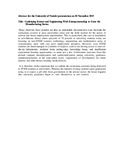| dc.description.abstract | Many observers have pointed out that an undeniable disconnection exits between the curriculum covered at most universities today and the skills needed for the nature of current and future employment opportunities. This is particularly the case at institutions in sub-Saharan Africa where upwards of 70 percent of university students today are focusing on non-STEM (science, technology, engineering and mathematics) areas of concentration, most with very poor employment prospects. However, even STEM students are disadvantaged in a number of respects, such as not having access to state-of-the-art laboratories, isolation from cutting-edge knowledge bases, and insufficient experiential learning opportunities, to name just a few. Unfortunate outcomes from this include rampant unemployment and underemployment among university graduates, underrepresentation in the innovation factor, suppression of development for entire nations, and other threats looming on the horizon.
It is therefore vitally important that we rethink the curriculum currently being delivered to STEM students at universities. Whereas the mindset of many students upon graduation today is to expect a job offer from government or the private sector, the future requires that university graduates begin to view themselves as job creators – not only for themselves but also for others who are less fortunate. I will attempt to make the case in my presentation that universities in sub-Saharan Africa need to embrace the concept of innovation-driven entrepreneurship through creation and expansion of experiential, hands-on, learning opportunities, developed in partnership with the private sector. Start-up companies that might develop from these interactions would be wise to focus on emerging technologies, particularly in areas of highest needs on the continent – smart agriculture, preventative health care, renewable energy, and high-tech manufacturing. Collective mobilization is warranted at the national and AU levels. To tackle the problem with urgency is to secure a prosperous future for all. | en_US |

